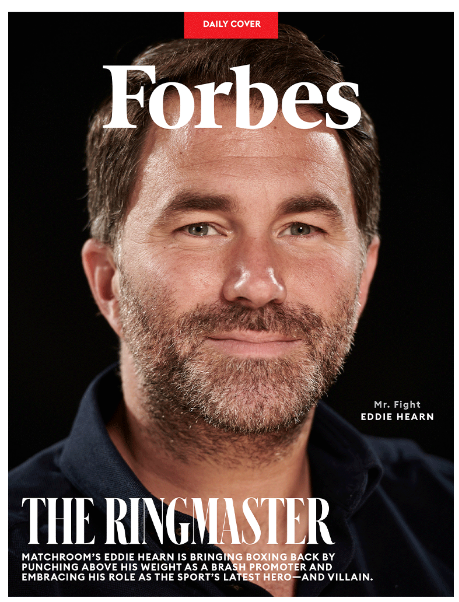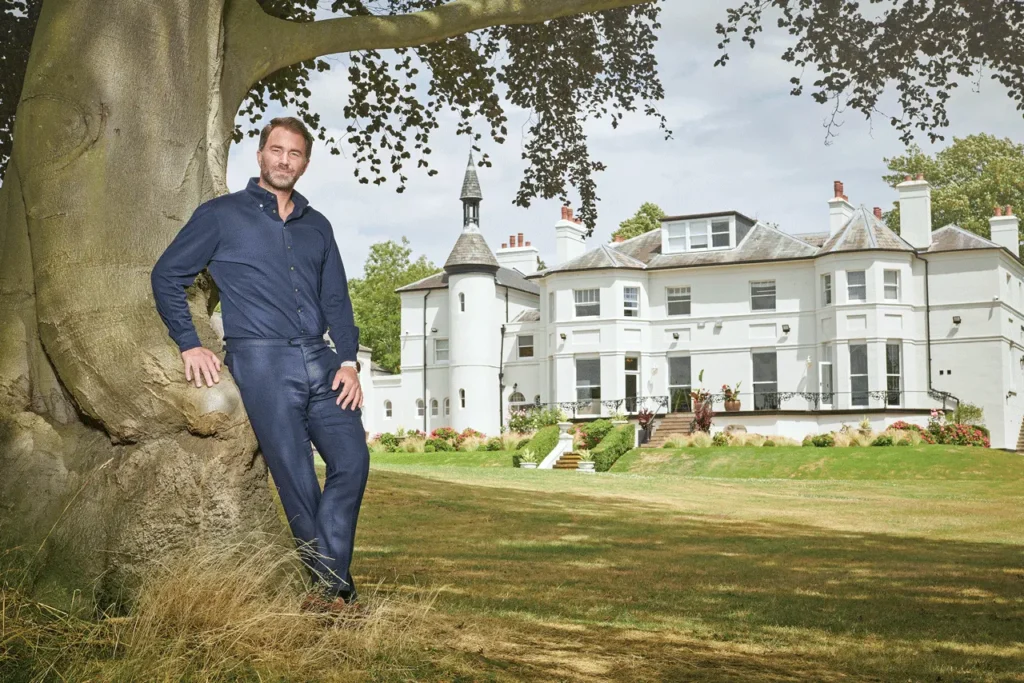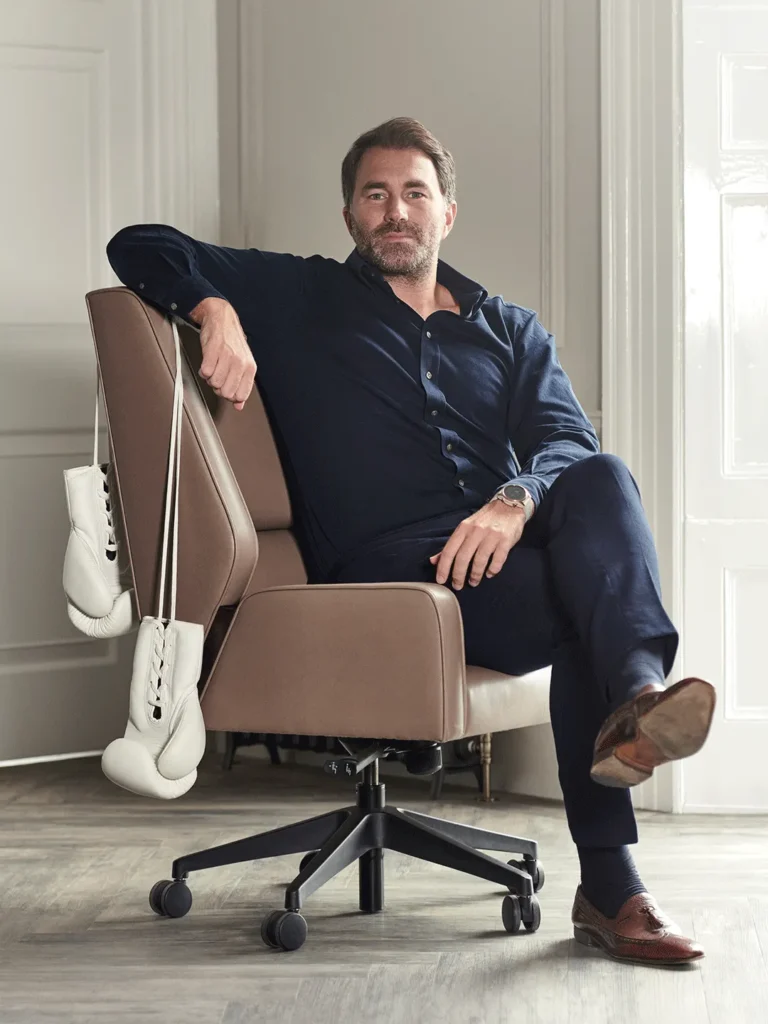In the Hilton Syon Park hotel, against the backdrop of another overcast London day in July, Eddie Hearn has orchestrated a media gathering, presenting what he hails as the next major boxing event in the U.K.—an August rematch between two-time former heavyweight champion Anthony Joshua and former British boxing titleholder Dillian Whyte. (Note: Following the publication of this story in the August/September issue of Forbes magazine, Whyte was replaced by Robert Helenius due to a failed drug test.) However, Hearn’s forward-thinking nature is evident.
Spotting former heavyweight contender Derek Chisora a few feet away, he playfully interrupts a YouTube interview with another fighter, Fabio Wardley. “What about you two?” Hearn jests, and to his surprise, both express interest, setting the wheels in motion. While it may not be a blockbuster match, for boxing’s perennial hype machine, no spotlight is deemed too small or too large.

At 44, Eddie Hearn revels in putting on a spectacular show. The energetic entrepreneur has propelled his family’s event promotion company, Matchroom Sport, to unprecedented heights, with Forbes estimating fiscal 2023 (ended June 30) revenue at $365 million and a net profit of $60 million. A significant portion of this success is attributed to the remarkable revitalization of the boxing division, which Hearn has guided since 2012, transforming it from a modest enterprise into a global brand. Boxing now stands as the driving force behind Matchroom Sport, contributing over half ($235 million) to its estimated annual sales and nearly $20 million to its cash flow. Positioned as a powerhouse in U.K. boxing, a burgeoning and profitable player in the U.S., and a growing force in emerging markets like the Middle East, Matchroom Sport’s boxing division has achieved remarkable success.
This level of accomplishment surpasses the initial vision of Eddie’s father, Barry, who founded the company in 1982 with just £100, initially focusing on snooker and later expanding into darts and other niche sports. By the time Eddie joined Matchroom in 2000, Barry had built a respectable promotion business, generating approximately $1 million in profit from $10 million in revenue. In 2012, when Eddie proposed an ambitious plan to elevate the company’s boxing operations, Matchroom’s entire net profit was less ($7 million on $46 million revenue) than what the boxing division alone achieves today. Reflecting on his son’s achievements, Barry, now 75, acknowledges, “I always had dreams, but Eddie’s shown me that there is another level.”

Mind Your Manor: Eddie Hearn’s childhood home outside London serves as Matchroom’s headquarters, where he keeps a Tale of the Tape comparing his accomplishments to his father’s. LEVON BISS FOR FORBES
In many ways, Matchroom has breathed new life into a sport often perceived as stagnant, or even declining. Boxing, which once took center stage, has found itself overshadowed by mixed martial arts in the UFC over the last decade. This stands in stark contrast to iconic moments like the 1974 “Rumble in the Jungle,” where Muhammad Ali’s knockout of George Foreman drew massive global attention. In comparison, UFC’s streamlined title belts, intense Octagon battles, and charismatic fighters have captured the imagination of younger audiences, leading to a significant acquisition by media conglomerate Endeavor in 2016. With the impending merger with WWE, the combined entity is set to become a publicly traded powerhouse valued at $21 billion.
Meanwhile, Matchroom, under Eddie Hearn’s leadership, produced over 3,000 hours of programming across 12 sports, featuring 30 fight nights in the past year. Hearn has successfully promoted some of boxing’s biggest stars, including Anthony Joshua and pound-for-pound champion Canelo Alvarez. Departing from traditional broadcast and pay-per-view methods, Hearn orchestrated a groundbreaking move in 2018 by signing an eight-year deal with the streaming service DAZN, estimated to be worth a total of $1 billion.
However, Hearn isn’t content with the status quo. He envisions an even grander future for Matchroom, contemplating an initial public offering (IPO) to expand beyond 100% family ownership. Despite recent negotiations with CVC Capital breaking down, Hearn indicates that Matchroom has received interest from various private equity firms.
Reflecting on his ambitious aspirations, Hearn acknowledges the challenges of surpassing his successful father, Barry, who founded Matchroom in 1982. Starting with a modest £100 investment and a focus on snooker, Barry’s business initially earned approximately $1 million in profit from $10 million in revenue when Eddie joined in 2000. In 2012, Eddie proposed a radical plan to elevate the boxing division, and since then, Matchroom’s boxing operations alone have outperformed the entire company’s net profit from that time. Barry notes, “I always had dreams, but Eddie’s shown me that there is another level.”
Hearn’s journey from growing up in Essex to becoming a key player in the sports promotion industry involved playing cricket and rugby, with academics taking a back seat. Rejecting college, he entered the workforce, securing his first job at a sports management company and eventually joining Matchroom in 2000. From promoting golfers to venturing into poker during the Texas hold ’em craze, Hearn’s career trajectory shifted significantly after meeting former Olympic gold medalist Audley Harrison in 2009. Agreeing to promote Harrison led to a heavyweight title shot and sparked the exclusive broadcast deal with Sky Sports in 2012.
Unafraid to ruffle feathers, Hearn entered the U.S. market boldly, proclaiming Matchroom’s intent to take over American boxing within three months. His strategy involved upsetting people, building a profile, and creating noise, making him a hero to some and a villain to others. Hearn’s positioning for boxing’s next phase involves thinking globally, exploring opportunities to host championship bouts in the Middle East and Asia for site fees.
While contemplating his eventual departure from boxing, Hearn acknowledges the sport’s consuming nature, emphasizing the need to remain dedicated to maintaining Matchroom’s dominant position. The U.S. boxing market, estimated at around $440 million, is projected to grow 3.4% through 2027, but Hearn’s global vision positions Matchroom for continued success.

